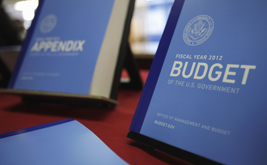
The Breakdown: What Can The Federal Reserve Do for You? The Breakdown: What Can The Federal Reserve Do for You?
Matthew Yglesias joins Chris Hayes to explain the vital role the Fed plays in managing the health of the economy.
Apr 8, 2011 / Chris Hayes

The Breakdown: Are Antitrust Laws a Thing of the Past? The Breakdown: Are Antitrust Laws a Thing of the Past?
With AT&T's announcement that it will buy T-Mobile, the wireless industry goes from four major carriers to three. Does anyone care about antitrust laws anymore?
Apr 1, 2011 / Chris Hayes

The Breakdown: Is the US Military Action in Libya Unconstitutional? The Breakdown: Is the US Military Action in Libya Unconstitutional?
Members of Congress on both sides of the aisle have started questioning the constitutionality of Obama's announcement that the US will pursue military operations in Libya.
Mar 25, 2011 / Chris Hayes

The Breakdown: Why Are Public Pensions ‘Unfunded’? The Breakdown: Why Are Public Pensions ‘Unfunded’?
In their assault on public sector workers, Republicans continue to point to so-called "unfunded" pension programs as a symbol of broken government. But how did the pensions become ...
Mar 18, 2011 / Chris Hayes

The Breakdown: How Can Obama Help Organized Labor? The Breakdown: How Can Obama Help Organized Labor?
With no help likely to come from Congress, Dorian Warren and Chris Hayes ask: what can Obama, his National Labor Relations Board appointees and Secretary of Labor Hilda Solis do to...
Mar 11, 2011 / Chris Hayes

The Breakdown: Do Corporations Deserve ‘Personhood’? The Breakdown: Do Corporations Deserve ‘Personhood’?
The Supreme Court recently ruled in FCC v AT&T that corporations cannot claim a right to personal privacy under the Constitution. Will that decision affect past cases that aff...
Mar 4, 2011 / Chris Hayes

The Breakdown: Why Aren’t Corporations Paying Their Taxes? The Breakdown: Why Aren’t Corporations Paying Their Taxes?
With pressure for deficit reduction mounting on both sides of the aisle, will legislators go after uncollected corporate taxes? Christopher Hayes asks David Cay Johnston why this r...
Feb 25, 2011 / Chris Hayes

The Breakdown: Is the Federal Deficit Actually Bad for Our Economy? The Breakdown: Is the Federal Deficit Actually Bad for Our Economy?
Would getting rid of the federal deficit be the silver bullet for our ailing economy? Robert Pollin explains why the standard arguments against deficit spending don't tell the whol...
Feb 18, 2011 / Chris Hayes

The Breakdown: In an Age of Austerity, Can’t the US Cut the Military Budget? The Breakdown: In an Age of Austerity, Can’t the US Cut the Military Budget?
The US maintains the most expansive and expensive military on the planet. On this week's edition of The Breakdown, D.C. Editor Chris Hayes and Institute for Policy Studies Research...
Feb 11, 2011 / Chris Hayes

The Breakdown: Why Is Egypt in Revolt? The Breakdown: Why Is Egypt in Revolt?
Rampant corruption and arbitrary imprisonment, a senseless bureaucracy, a financially destitute majority and police-led torture of civilians—these are among the unbearable conditio...
Feb 2, 2011 / Chris Hayes
